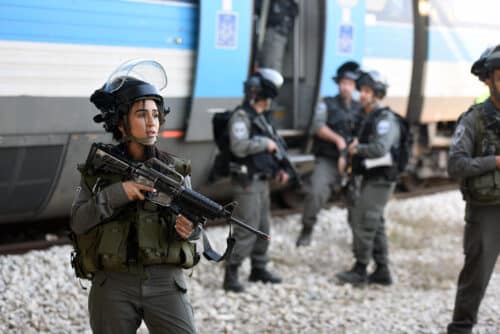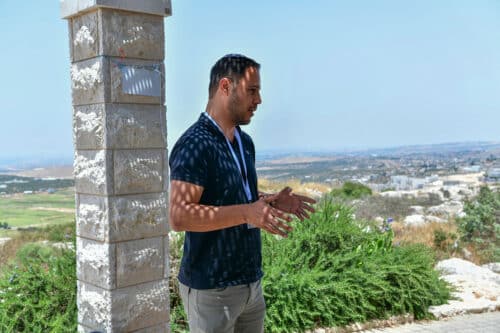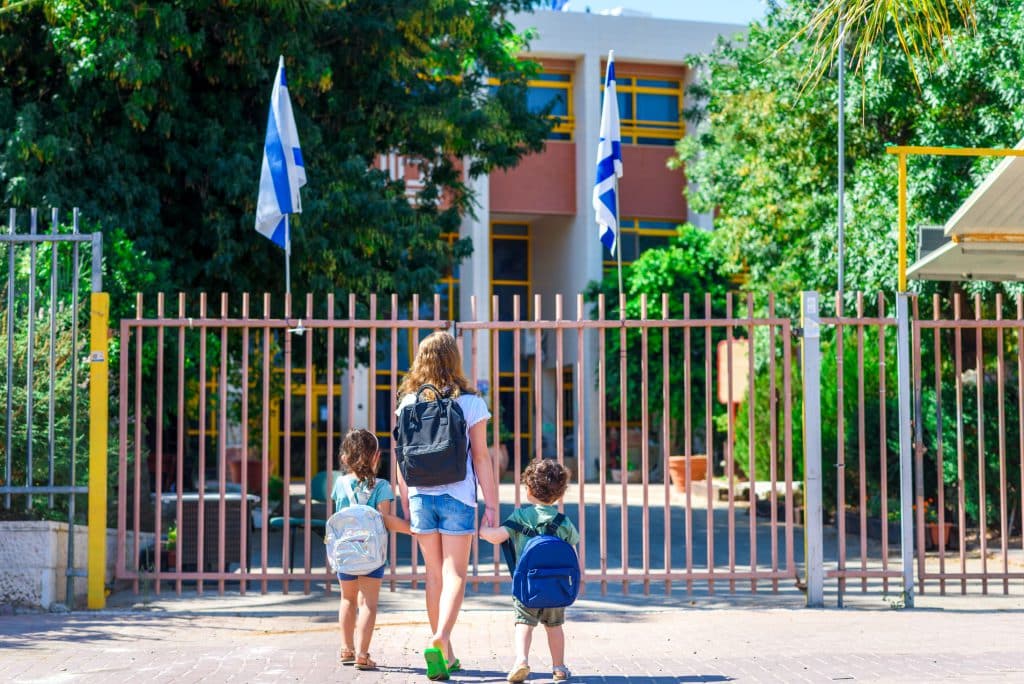
The IDSF’s ultimate goal is to ensure Israel’s security for generations to come. Two central understandings underpin this goal: The first is that the security of the State cannot exist in a vacuum; rather, it depends on an extensive system of political, economic and social factors. The second understanding is that in order to make informed decisions, it is necessary to build a broad strategy that is based on the past and looks to the future.
These understandings have led the IDSF to formulate a clear national vision based on in-depth research and touching on all the areas that shape Israeli society. In this article, Col. (res.) Dr. Ronen Itzik will discuss the future of the Israeli educational system and the responsibility it bears regarding the generations yet to come.
Israel’s educational system – Grades instead of Zionism
The education system meets the citizens of Israel during the most formative years of their lives, and has a decisive role in instilling national values, creating a sense of belonging, and forging the fortitude of each person as an individual and of all of us as a society and a nation.
However, from in-depth studies conducted among parents, teachers and students, including a comprehensive study conducted by the IDSF, it appears that everything in Israel’s education system that is related to instilling values, and in particular in instilling the values of heritage, Jewish identity and the national ethos, is steadily eroding. In addition, due to a fear of public pressure and parental criticism, the education system avoids dealing with the Palestinian-Israeli struggle, does not discuss in any significant way the security incidents that have taken place here over recent years, and almost never touches on the significance of IDF service and the importance of personal sacrifice for the common good. Furthermore, the system has become a “grades factory” that emphasizes only individual achievements while ignoring the principles of teamwork and cooperation, and with no desire to prepare the male and female students for life in the State of Israel in all its unique characteristics.
Some of the problems mentioned are the product of global social trends that emphasize individualism over collectivism and preach political correctness at any cost and in any situation. Other problems arise from a process of alienation from the heritage of the Jewish people and the history of the State of Israel. In addition, there are also problems related to systemic issues such as inefficiency, the lack of appropriate staff, and the use of outdated educational methodologies.
Below, Dr. Ronen Itzik will lay out his ideas for the future of the education system in Israel, so that it can fulfill its deepest purpose.
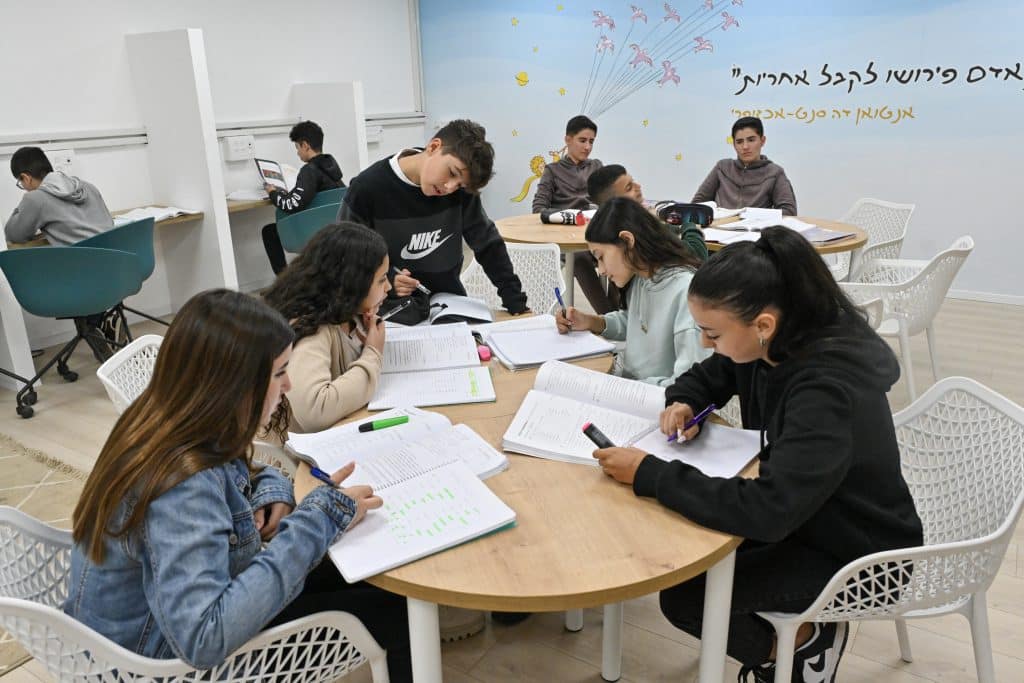
Dr. Ronen Itzik: The Vision for the Future of the Israeli Education
The importance of the group and looking at the individual in a group context
Current state: Throughout the Western world, there has been a trend of individualism in recent years that glorifies the individual at the expense of the group. Israel is also affected by this trend, and it can also be seen in its education system, which almost completely neglects its responsibility towards the collective. The system mainly puts an emphasis on individual accomplishments and is busy with incessantly testing the individual student while ignoring group achievements and products of cooperative efforts.
The individual is undoubtedly the cornerstone of the Western world as well as the Jewish one, but Israeli reality, in which the group is a condition for the existence of the individual, dictates a different and more balanced approach.
Ideally:
Besides developing the individual’s abilities and aspirations, the education system should also deal with the responsibility of the individual towards the group, strengthen the students in the group, and instill in them the understanding that what will lead to achievements, national as well as private, is the group and not the individual. The way to accomplish this change is by focusing on two levels:
- Operational: Significant reduction of the weight given to personal achievements while encouraging group achievements, and measuring the individual’s achievements within the group and in connection to it.
- Values: Already in elementary school, the values, shared history, shared Jewish identity and traditions that accompany us as a nation should be instilled in the children, and a common national and group identity should be created for them.
Deliberate and structured engagement in the history of the regional conflict
Current state: The struggle between the State of Israel and the countries that surround it, which includes the national-Palestinian conflict, affects the existence of us all, and we do not have the luxury of not understanding its roots, the reasons why we are here in Israel, and the values that form the basis of our belief in the righteousness of our path. And yet, the education system systematically avoids dealing with the national struggle and political matters. This avoidance leaves the students with completely unreasonable gaps in their knowledge of the security reality and the national challenges connected to the State of Israel. So, for example, according to an IDSF survey, 45% of young adults in Israel do not know anything about Operation Defensive Shield– a significant and formative military campaign that took place only some twenty years ago.
As long as the education system continues to avoid discussing these important topics, we are exposed to two fundamental problems: The first is that many students will not understand Israeli reality at all and will lose their attachment to the land and the values of protecting the homeland. The second – and much more serious one – is that some of the students will search for information in other, unreliable and biased places, and will construct a world view that is far from their national and self-identity.
Ideally:
- The education system should strengthen the curriculum on the subject of the history of the Jewish people in general and the roots of the regional conflict in particular. To preserve balance and prevent a situation in which deviations of one kind or another occur, it is advisable to combine the contents in one organized and approved set of lesson plans that will be created by a representatives of diverse sectors of Israeli society and focus first and foremost on research, facts, and knowledge.
- The education system should outline a way to put the history of the national struggle onto the agenda, and convey politically complex ideas to the students by providing time for open discussions in the classrooms and their conducting guided research work, among other ways. The basic concept required to achieve this is that “Zionism” is not a political issue.
Changing teaching methodologies
Current state: The prevailing methodologies in most schools are outdated and do not lead to the full exploitation of students’ learning potential. According to an IDSF survey, most teachers claim that working in groups is more effective than the “teacher-centered” method, where the students sit and listen to the teacher speak. Nevertheless, most concede that they practically never allow learning in groups due to the lack of time, the difficulty in controlling the class, and the lack of cooperation both on the part of the students and the staff.
Moreover, there is almost no learning taking place outside the classroom, even though during the COVID-19 epidemic we saw that classes held out of doors provide students with experiential learning, and help them maintain concentration and interest. Similarly, there are almost no extracurricular activities such as tours and tutorials, which reinforce the social aspect of education, give students an opportunity to broaden their horizons, and connect them to sites in the country.
Another problem is that every subject is learned separately, as a discipline unto itself, and there is no understanding of its broader context. Thus most students do not know how to connect topics they have studied in the Bible, for example, with topics they have studied in other fields, such as history and geography.
Ideally:
- Teachers should be encouraged to minimize the “teacher-centered” educational method, and incorporate during the lesson as much group work as possible, which encourages the students to be active and cooperate with each other.
- Time should be dedicated to extra-curricular activities and teachers’ private initiatives to teach outside the classroom walls and even outside the school building should be supported.
- We should strive for integrative and multidisciplinary learning that enables creative connections between several subjects and thus contributes to understanding the whole picture.
Preparation for life, not for academia
Current state: The education system regards higher education as an anchor, and busies itself with preparing students for academia rather than preparing them for life. This approach leads to the system putting the main emphasis on the high schools, and tends to neglect the elementary schools that actually play a more central role in shaping the students’ personalities. On top of that, the system is engaged in the non-stop calculation of subject-oriented grades.
Another product of the academic-oriented approach is that in most schools the curriculum includes only theoretical subjects and does not integrate practical subjects at all. Furthermore, the vocational schools, which were prevalent in Israel until the Nineties, have been almost completely erased from the educational landscape.
This is how the sad situation was created in which students in Israel finish 12 years of study without being ready for life or having any professional training. Many of the students who are not suited for academia but rather for other professions, lose interest in their studies and even drop out of the system.
Ideally:
- The education system must change its approach and understand that academia is not the be-all and end-all, and that it is much more important to prepare the students for life. To this end, it must shift the center of gravity away from high schools and recognize the importance of the elementary school years as those that are the most formative.
- Evaluation methods must be found that are not based on dry grades alone, but rather look at all of the students’ abilities. Such methods will enable more students to express their abilities, and will save a great deal of frustration for those who do not manage to attain high grades.
- Along with the theoretical studies, subjects and majors that will give students practical tools and life skills must be integrated into the educational system. In addition, it is worthwhile rebuilding vocational schools and allowing students interested in acquiring a profession already during their school years to do so. It is worth noting that vocational training will not only help the students but also the country, which will gain a skilled workforce that will contribute to the development of local industry.
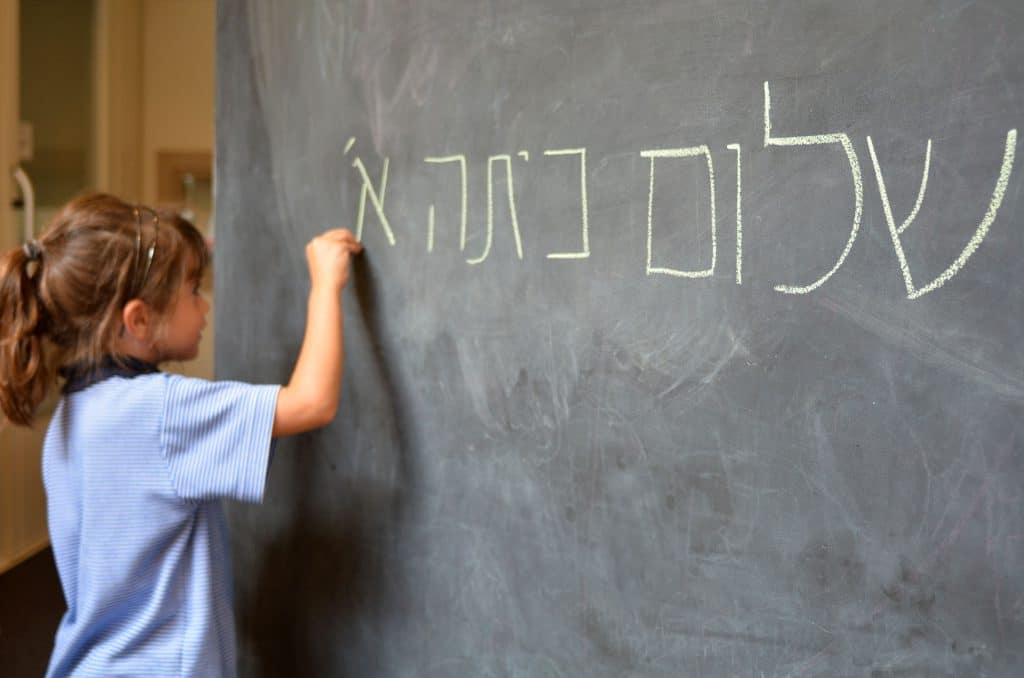
The education system should take on the task of preparing students for meaningful service
Current state: Just as the schools in Israel do not prepare the students for life, they also do not prepare them for service in the IDF. According to IDSF research, 65% of teachers believe that it is very important to deal with the subject. However, fewer than 30% of them believe that this involvement is taking place at the required level.
Since the students – and as a result, the teachers and administrators as well – are measured by their grade scores, the interest of the system is to devote as much time as possible to augmenting study and preparation for the matriculation exams, and not “waste” it on other activities, such as preparation for the IDF. We have seen in recent years that fewer and fewer schools are sending students out for the week of “Gadna” (where teens experience military training on army bases), and other preparatory activities for IDF service, such as lectures and tours of bases, have also been reduced and downgraded.
Since preparation for IDF service in high schools is lacking, many young men and women feel the need to enroll in a year-long preparatory program. From the point of view of the education system, this is a wonderful solution because there is an alternate body that is dealing with getting ready for the IDF, but it does not make sense that students should be required to use a year of their lives to compensate for the fact that their schools did not prepare them properly for military service.
Ideally:
- The education system has a responsibility to prepare both male and female students for the military service that awaits them immediately upon graduation from high school. To this end, it should recognize the importance of integrating contents related to IDF service, and encourage collaborations with nonprofits and organizations that specialize in this subject.
- The education system should devote time dedicated to activities that will prepare their students for army duty. One option is to allocate time slots during grades 11-12 that will be devoted exclusively to such activities. Another option is to shorten twelfth grade by several months and devote the remaining time until the end of the school year to focused preparation for military service.
Longer classes, shorter days
Current state: The way in which the school day is structured is fundamentally wrong. In many schools, the day lasts from 8AM until 4PM. Many studies in education and psychology show that it is impossible to keep children and youth for so many hours and expect them to be focused.
Another problem is linked to the length of the class. We are stuck to the idea that a lesson should be 45 minutes long, but when looking at it from a practical point of view, we see that it is impossible to teach almost anything in such a short amount of time. It is certainly impossible to conduct any in-depth discussions in a classroom situation.
Ideally:
- The length of the school day should be re-evaluated and verified that it conforms to the capabilities of the students. We recommend that the school day should end no later than 1PM, and then the students should be released to their homes or provided with extracurricular activities within the class setting.
- We must free ourselves of the concept that a lesson has to be an academic hour long, and extend its duration from 45 minutes to a full hour. Only in this way will the teachers be able to convey the material effectively, and encourage the students to take an active part in the lesson.
Improving the education system
Current state: It is accepted to claim that the education system is not functioning properly because of a lack of money, but in practice this system receives a huge annual budget of approximately NIS75 billion. The problem, then, is not the money but what is done with it.
Ideally:
- The education budget should be managed in an intelligent and transparent manner, and the financial investment should focus on the school and the teachers – where the education actually takes place.
Excellence and innovation above all else
Current state: Leaders are needed for any process of change, but in the State of Israel there are almost no visionary leaders anymore who would be willing to push the education system forward. This is related, among other things, to the fact that the role of education in Israel is not important enough. In addition, the teachers’ organizations are very powerful bodies that stick spokes in the wheels of any process that seeks to optimize the system, thereby weaking the hands of the few who try to bring about change.
Moreover, the staff – including teachers, coordinators, and administrators – are not always qualified enough to fulfill their roles properly. Today, almost anyone who wants to obtain a teaching certificate can do so, since the threshold requirements are very low.
Thus, when the educational leadership does not come from a place of vision and lacks the ability to lead, when teachers’ unions do not cooperate with processes of change, and when many educators do not possess the required abilities, the results are predictable.
Ideally:
- The status of the education system should be improved, both in the eyes of the government and those of the public. If the Minister of Education is perceived as one of the three most important ministers in government, the entire system will attract visionary leaders.
- In order to carry out in-depth processes and bring about real changes, the teachers’ organizations must be put in their place and we cannot succumb to their whims and threats.
- The minimum requirements for issuing a teaching certificate should be raised, and quality personnel with a sense of mission should be recruited. At the same time, the teachers and administrators must be rewarded with an adequate salary, and they should be provided with working conditions that will allow them to feel professional satisfaction, and encourage them to choose the profession and persevere in it.

Evolution, not Revolution: Summary and Conclusions
From the dawn of history Israeli society has lived under threat. In order to survive and thrive here, we must recognize what the local reality is, understand what dangers and challenges face us, and learn how to deal with them. All these things, as a concept, simply do not exist in the education system. We tend to look to Western and European countries and try to adopt educational models that are successful in other parts of the world, but do are not suitable for the nature of the State of Israel and Israeli society. If we continue to look for solutions in foreign places, it will only lead to frustration. The State of Israel has unique cultural elements, and the challenges of the education system must be derived from our national challenges.
Unfortunately, the results on the ground prove again and again that the education system – despite enjoying a very high budget – is not run effectively. It uses outdated and uncreative teaching methodologies, prefers high grade scores over any other value, and neglects all involvement with the national ethos. As a result, the system fails to prepare the younger generation for life in the State of Israel.
One thing is clear about the education system and that is that the situation as it is cannot continue. A fundamental, vision-based reform is required here, which includes a change in personnel, educational methodologies and contents. However, it is important to understand that processes of this type take time, and therefore we must forget about a revolution and prepare for a long evolutionary process. The goal is not to dismantle the framework and rebuild it, but to bring about measured and intelligent changes that will gradually and persistently improve the system.


